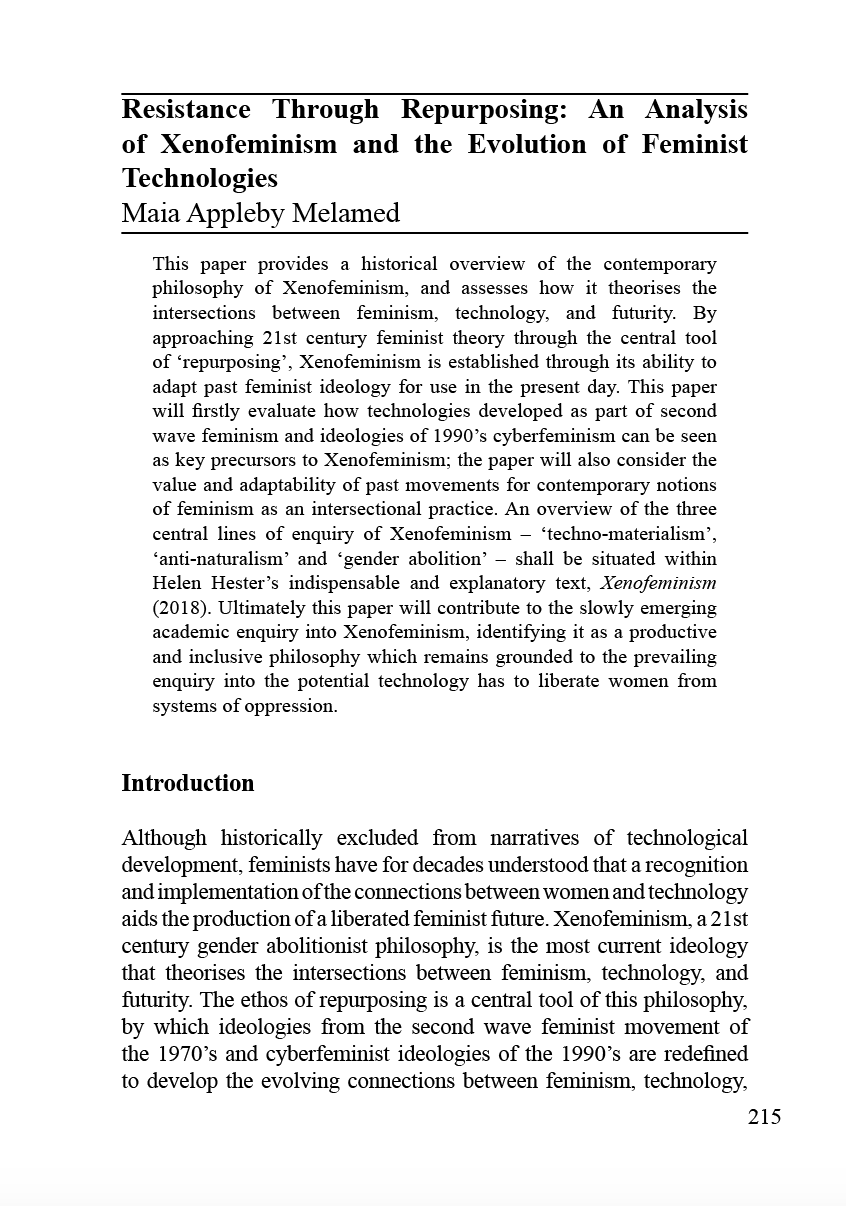Resistance Through Repurposing
An Analysis of Xenofeminism and the Evolution of Feminist Technologies
DOI:
https://doi.org/10.36399/GroundingsUG.15.126Keywords:
Xenofeminism, Women's Studies, Abortion rights, Women's rights, Protest, Cyberfeminism, Techno-materialismAbstract
This paper provides a historical overview of the contemporary philosophy of Xenofeminism, and assesses how it theorises the intersections between feminism, technology, and futurity. By approaching 21st century feminist theory through the central tool of ‘repurposing’, Xenofeminism is established through its ability to adapt past feminist ideology for use in the present day. This paper will firstly evaluate how technologies developed as part of second wave feminism and ideologies of 1990’s cyberfeminism can be seen as key precursors to Xenofeminism; the paper will also consider the value and adaptability of past movements for contemporary notions of feminism as an intersectional practice. An overview of the three central lines of enquiry of Xenofeminism – ‘techno-materialism’, ‘anti-naturalism’ and ‘gender abolition’ – shall be situated within Helen Hester’s indispensable and explanatory text, Xenofeminism (2018). Ultimately this paper will contribute to the slowly emerging academic enquiry into Xenofeminism, identifying it as a productive and inclusive philosophy which remains grounded to the prevailing enquiry into the potential technology has to liberate women from systems of oppression.
References
Addeo, Felice & Ragnedda, Massimo & Ruiu, Maria Laura. “The Self-reinforcing effect of digital and social exclusion: The inequality loop”. Telematics and Informatics 72, (2022): 1-13.
Baker, Carrie N. “Abortion How-To: The Ms. Q&A on Menstrual Extraction With Carol Downer”, Ms. July 14, 2022. https://msmagazine.com/2022/07/14/abortion-how-to-carol-downer-menstrual-extraction/.
Cleghorn, Elinor. Unwell Women. New York: Penguin Random House, 2021.
Delfino, Devon. “What is AFK’s meaning? The history behind the internet acronym and how to use it in a chat”. Business Insider. March 26, 2021. https://www.businessinsider.com/guides/tech/afk-meaning?r=US&IR=T.
Edelman, Lee. No Future: Queer Theory and the Death Drive. North Carolina: Duke University Press, 2004.
Ehrenreich, Barbara & English, Deirde. Complaints & Disorders: The Sexual Politics of Sickness. New York: Feminist Press at The City University of New York, 1973.
Enking, Molly Cora. “Women are being cut during childbirth without need or consent”, CUNY Academic Works 12, no. 16 (2018): https://academicworks.cuny.edu/gj_etds/285.
Evans, Claire, L. “An Oral History of the First Cyberfeminists” Motherboard Tech by Vice. December 11, 2014. https://www.vice.com/en/article/z4mqa8/an-oral-history-of-the-first-cyberfeminists-vns-matrix.
Goh, Annie. “APPROPRIATING THE ALIEN: A CRITIQUE OF XENOFEMINISM”. Mute. July 29, 2019. https://www.metamute.org/editorial/articles/appropriating-alien-critique-xenofeminism.
Hao, Ani, Phoebe. “INTERNET FREEDOM IS NOT ENOUGH – CYBERFEMINISTS ARE FIGHTING FOR A NEW REALITY”. GenderIT.org. December 4, 2019. https://www.genderit.org/articles/internet-freedom-not-enough-cyberfeminists-are-fighting-new-reality
Haraway, Donna J. Staying with the Trouble: Making Kin in the Chthulucene. North Carolina: Duke University Press, 2016.
Hester, Helen. “After the Future: n Hypotheses of Post-Cyber Feminism”, Res.(2017): http://beingres.org/2017/06/30/afterthefuture-helenhester/.
Hester, Helen. Xenofeminism. Cambridge: Polity Press, 2018.
Holt, Macon. “What is Xenofeminism?” Ark Books, (2018): http://arkbooks.dk/what-is-xenofeminism/.
Huc-Hepher, Saskia. “Queering the web archive: A xenofeminist approach to gender, function, language and culture in the London French Special Collection”. Humanities Social Science Communications 8, no. 298 (2021): https://doi.org/10.1057/s41599-021-00967-8
Muhammad, Zia. “37% of Women Still Don’t Have Internet Access in 2022.” Digital Information World. June 12, 2022. https://www.digitalinformationworld.com/2022/12/37-of-women-still-dont-have-internet.html.
Pauslon, Steve. “Making Kin: An Interview with Donna Haraway”. Los Angeles Review of Books. December 6, 2019. https://lareviewofbooks.org/article/making-kin-an-interview-with-donna-haraway/.
Pfannebecker, Mareile. “Long Read Review: ‘Repurpose your Desire: Xenofeminism and Millennial Politics”, LSE Review of Books Blog. August 17, 2018. https://blogs.lse.ac.uk/lsereviewofbooks/2018/08/17/long-read-review-repurpose-your-desire-xenofeminism-and-millennial-politics-by-mareile-pfannebecker/.
Plant, Sadie. Zeros + Ones. New York: Doubleday, 1997.
Raymond, Janice. The Transexual Empire. Boston: Beacon Press, 1979.
“Remarks by President Biden on the Supreme Court Decision to Overturn Roe v. Wade”. WH.GOV. June 24, 2022. https://www.whitehouse.gov/briefing-room/speeches-remarks/2022/06/24/remarks-by-president-biden-on-the-supreme-court-decision-to-overturn-roe-v-wade/.
Sage-Femme Collective. Natural Liberty: Rediscovering Self-Induced Abortion Methods. Las Vegas: Sage-Femme!, 2008.
“The Artists”. VNS Matrix / Merchants of Slime. Accessed December 2, 2023. https://vnsmatrix.net/the-artists
VNS Matrix. “The Cyberfeminist Manifesto for the 21st Century.” VNS Matrix. Accessed 25 November 2023. https://vnsmatrix.net/projects/the-cyberfeminist-manifesto-for-the-21st-century.
“Xenofeminism.” Laboria Cuboniks, Accessed: November 30, 2023. https://laboriacuboniks.net/books/xenofeminism-helen-hester/.
“85% of women have witnessed harassment and online Violence”, The Economist Group. March 3, 2021. https://www.economistgroup.com/group-news/economist-impact/85-of-women-have-witnessed-harassment-and-online-violence-finds-new-research.

Downloads
Published
Issue
Section
License
Copyright (c) 2024 Maia Appleby Melamed

This work is licensed under a Creative Commons Attribution 4.0 International License.
The CC BY 4.0 license is a Creative Commons license. This is a non-copyleft free license that is good for art and entertainment works, and educational works. It is compatible with all versions of the GNU GPL; however, like all CC licenses, it should not be used on software. People are free to: Share — copy and redistribute the material in any medium or format; Adapt — remix, transform, and build upon the material for any purpose, even commercially. The licensor cannot revoke these freedoms as long as you follow the license terms. But they must conform to the following terms: Attribution — You must give appropriate credit, provide a link to the license, and indicate if changes were made. You may do so in any reasonable manner, but not in any way that suggests the licensor endorses you or your use. No additional restrictions — You may not apply legal terms or technological measures that legally restrict others from doing anything the license permits.
Please check individual article PDF copies to see if any additional restrictions apply.







